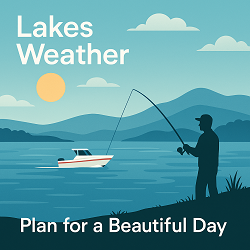Elizabethton, TN Weather Forecast and Current Conditions
Current Conditions From Nearby Local Station

Feels Like 54°F
at
Point Forecast at a Glance







7-Day Temperature Trend
Week Ahead Summary
High temperatures drop from 67°F to a low of 40°F, then recover to 57°F by week's end. Unsettled weather expected with rain likely on at least 5 days.
Climate Context
This week's forecast shows temperatures running 3°F above the historical average for November-December. Normal highs for this period are around 51°F with lows around 30°F.
This Date in Weather History
1950 - The temperature at Chicago, IL, dipped to 2 below zero to equal their record for the month established on the 29th in 1872. On the first of the month that year Chicago established a record high for November with a reading of 81 degrees.
Elizabethton, TN 7 Day Weather Forecast Details
Monday Nov 24

Night: A 20 percent chance of showers after 3am. Mostly cloudy, with a low around 49. East wind 5 to 10 mph.
Tuesday Nov 25

Day: Showers, mainly before 5pm. High near 67. South wind 10 to 15 mph, with gusts as high as 20 mph. Chance of precipitation is 80%. New precipitation amounts between a tenth and quarter of an inch possible.

Night: Showers and possibly a thunderstorm. Low around 54. South wind around 5 mph becoming west after midnight. Chance of precipitation is 80%. New rainfall amounts between a tenth and quarter of an inch, except higher amounts possible in thunderstorms.
Wednesday Nov 26

Day: A 30 percent chance of showers before 1pm. Partly sunny, with a high near 63. West wind 10 to 15 mph, with gusts as high as 25 mph.

Night: Partly cloudy, with a low around 28. West wind 10 to 15 mph, with gusts as high as 25 mph.
Thursday Nov 27

Day: Mostly sunny, with a high near 44. West wind 10 to 15 mph, with gusts as high as 25 mph.

Night: Mostly clear, with a low around 21. West wind around 10 mph, with gusts as high as 25 mph.
Friday Nov 28

Day: Sunny, with a high near 40.

Night: Partly cloudy, with a low around 22.
Saturday Nov 29

Day: Partly sunny, with a high near 51.

Night: A 20 percent chance of showers. Mostly cloudy, with a low around 32.
Sunday Nov 30

Day: A 30 percent chance of showers. Mostly cloudy, with a high near 57.

Night: A 50 percent chance of showers. Mostly cloudy, with a low around 38.
Monday Dec 1

Day: A 50 percent chance of showers. Mostly cloudy, with a high near 59.
About Elizabethton, TN
Content from Wikipedia, licensed under CC BY-SA 3.0.
How We Provide Better Local Weather
Current conditions: We use the nearest available station to your location - including professional MESONET/MADIS and local weather stations - often miles closer than regional airports.
Forecasts: National Weather Service point forecasts predict for your specific area, not broad regional zones, making them far more relevant to your location.



